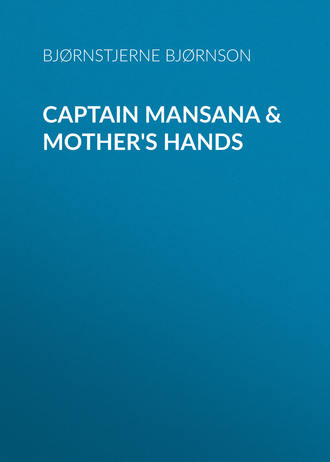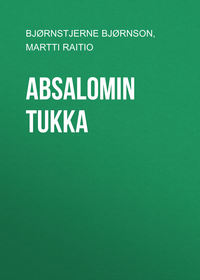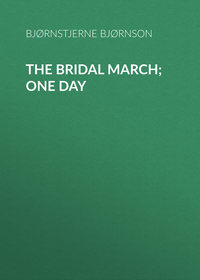 полная версия
полная версияCaptain Mansana & Mother's Hands
The echo of her own beseeching words, the jangle of the horses' bells, the mad movement of the poplars alongside, were all she had for answer, as they dashed on. No word came from the silent shape in front. There coursed through her mind a forecast of her pitiful progress through the city, driven onward by the lash, her swooning companion dragging on her arms, the crowd lining the pavements to stare at her, the officers pressing forward to greet her with mocking applause and laughter; for that all this was planned by the officers, to wreak their anger upon her, she now felt certain. She bowed her head as if she were already in the midst of her tormentors. The next moment she could tell by the sound that the horses were slackening speed. They must be close to their destination; but would they stop before they reached it? She looked up with a sudden rush of awakened hope. She perceived why the pace had grown slower. Her captor had fallen back behind the horses; he was now close beside her, and presently she found herself listening to his hurried, laboured breathing, until she could hear nothing else, and all her agonising fear fastened on it. What if this man should fall, with the blood streaming from his lips, in the Corso itself? That blood would be upon her head, for it was her defiant pride which had challenged his desperate feat; and his friends would tear her to pieces in their anger.
"Spare yourself," she implored, "I am conquered—I yield."
But as if this attempt to soften him had roused him anew, he made a final effort. With two or three long strides he was abreast of the horses, who quickened their pace instinctively as they felt his approach, but not soon enough to escape a couple of swinging strokes from the whip.
And now clear before her shone the lights of the first gas-lamps, those round the Cavour memorial; presently they would be at the Corso and the miserable farce would begin. She felt a mastering desire to weep, and yet no tears came; she could only bow her head upon her hands so that she might see nothing. Then of a sudden she heard his voice, though she could not distinguish the words; for the carriage was now rumbling over the paved causeway, and he was too exhausted to speak distinctly. She looked up, the man was gone! Merciful heavens! Had he fallen fainting to the earth? Her blood froze in her veins at the thought, but her fears were needless. She saw him walk slowly away, through the Corso, past the Café Garibaldi. Then she herself passed into the Corso, her horses at the trot, the crowd parting to let her through. She bent still lower over the rigid form of her friend, as it lay across her lap; shame and terror drove her onwards, as if with a scourge. A few minutes later, she was safely within the courtyard of her palace. Through the open gateway the horses had swung at full speed, so that it was a wonder the carriage was not upset or dashed to pieces. She was safe; but the strain had been too much for her, and she fainted away.
An old servant stood awaiting her arrival. He called for help, and the two ladies were carried upstairs. Presently the grooms who had been thrown from the carriage came up and related what had happened, so far at least as they knew it themselves. Ashamed and confused by the reproaches which the old retainer showered upon them for their clumsiness, they were only too willing to follow his advice, which was to hold their tongues, and say nothing about the affair. The horses had bolted, after a short halt, just as the grooms were about to mount to their seats. That was the whole story.
CHAPTER IV
When Princess Theresa Leaney came to herself again, all her strength and energy seemed gone from her. She would not rise, she scarcely touched her food, and allowed no one to remain near her. In silence her companion passed through the large mirror-room that adjoined the ante-room; in silence she returned when her duties were accomplished, and when she entered the small Gothic apartment which the princess occupied near the centre of the palace, she was still careful to observe the same silence. The servants followed her example. This elderly chaperon of Theresa's had been brought up in a convent, and had come out into the world with an exaggerated estimate of her acquirements and position. But ten or fifteen years' experience of the selfishness and crude egoism of youth had tended to dissipate such sentiments, and she eventually took a situation as a sort of superior companion in an aristocratic family. Slights and humiliations were inevitable in her position, but she bore them in silence, learning, as she grew older, to put up with many things; she grew reserved and taciturn, and applied herself diligently to the steady accumulation of money. With this object in view, she made a point of studying carefully the characters and habits of those she served, taking care that the information thus acquired should subsequently be of profit to both parties. It was her tactful knowledge of the character of the princess which had on this particular occasion enjoined that strict silence should be kept.
Suddenly, after the lapse of a few days, there came from the princess's little Gothic room the curt command, "Pack up," and subsequently this was followed by the intimation that a long journey was in prospect. A little later the princess herself appeared. Still silent and languid, she moved slowly about the rooms, arranged some trivial matters, wrote a letter or two, and disappeared again. Next day came forth the order, "This evening at seven o'clock," and punctually at six o'clock she herself emerged, dressed in black travelling costume, followed by her maid, also dressed for a journey. The companion stood in readiness, waiting, before giving the man-servant the final order to close the luggage, till the princess had bestowed an approving glance on the contents. She had not as yet ventured to speak to the princess since the carriage adventure, but now, approaching her casually, she remarked in a low voice, with her eyes fixed on the courtyard, "The town knows nothing beyond the fact that the horses bolted with us." This remark was greeted by a look of haughty displeasure, which gradually changed to one of surprise and finally dismay.
"Is he dead, then?" the princess asked, each word breathing her anxiety.
"No, I saw him an hour ago."
The companion had hitherto studiously avoided meeting the eye of the princess, and still kept gazing into the courtyard towards the stables, where the carriages and horses were being got ready for the journey. It was some time before she thought it advisable to look round, as the princess kept silent, and the servant made no movement; the latter, indeed, had studiously kept his eyes fixed upon the ground before him; but when, at last, she ventured a glance at her patroness, she saw in a moment that the information she had given had worked the desired effect.
Theresa's excited and overstrained imagination had, during those last few feverish days, shown her the whole town full of a scornful merriment at her expense; she had pictured the story, familiar even in Rome itself, and possibly, by means of the newspapers, known to the world at large; she had realised the humiliation and defeat which her inflexible and domineering pride had suffered in those few terrible moments. The thought was as painful to her as though she had been dragged literally through mire. And now, after all, no one but themselves and this Mansana knew of what had taken place. He had kept the secret. Truly a remarkable man!
The beautiful eyes of the princess flashed radiantly for a moment, then gradually melted into smiles, as with raised head and upright figure she paced awhile up and down the room, as far as the luggage and travelling impedimenta would allow; then, lightly swinging her parasol, she said smilingly: "You can unpack; we shall not travel to-day," and hastily left the room.
An hour later, the companion received through the maid a message requesting her to get ready for a walk. She felt tempted to an expression of surprise, in answer to the look of astonishment with which the maid accompanied the command; for during all the long and frequent visits they had paid to Ancona, the princess had never before consented to take part in the fashionable evening promenade; but recollecting that in a servant such a look was an impertinence, she kept her feelings to herself. As Theresa entered the large pillared mirror-room, dressed for the promenade, she looked through the open door into the dimly-lighted ante-room, and saw her companion standing ready and awaiting her. The expression on the maid's face, as she followed to open and shut the door, was amply justified by the unusually handsome costume which the princess wore; the companion, however, came up as though she were quite accustomed both to the expedition and to seeing the princess thus elaborately arrayed.
In a beautiful mauve silk gown, richly trimmed with lace, Theresa swept down the stairs. Her figure, instinct with vigour and strength, though perhaps a trifle too fully moulded yet gave an impression of supple grace, because of her height and the ease and lightness of her bearing. Contrary to the fashion, her hair was arranged in plaits, whilst behind her fluttered a long lace veil, which she wore fastened on one side by a brooch and by roses on the other. The large sleeves of her dress hung so loosely that even the long gloves scarcely covered her arms as she moved them when she used her fan. She stepped on briskly, not deigning to wait for her companion, whose business it was to be always at her side.
It was a lively evening on the promenade, the weather having cleared for the first time after several days of storm; and as the princess made her way through the crowd, the noisy hum of voices would momentarily cease, to burst out again, after she had passed, like a river dammed up and suddenly released.
Princess Theresa Leaney appearing at the evening promenade! Princess Theresa Leaney on the Corso! And in what guise! Radiant with a glow of beauty, wealth, and graciousness, she had greetings and a friendly word for every one; ladies she had known from childhood, tradesmen she had dealt with, officers and noblemen she had occasionally met—all received their share of favour. Though in this place, which in all Italy is the most renowned for the charms of its women, she might not have actually borne away the palm, she had, nevertheless, won for herself from far and near a reputation as one of the beauties of Ancona, and for many years the town had been prepared to fly her colours, and pay her homage, had she but desired it. And now, apparently, she did desire it! There was a look of ingratiating appeal in her eyes as she greeted "her people;" and in the bend of her head, as she acknowledged their salutes, there seemed a suggestion of conciliation.
One turn up and down the promenade sufficed to show her the change in the feeling of her "subjects" towards herself; and, seeing the members of one of the oldest aristocratic families of the place grouped in front of a café in the centre of the Corso, she ventured to stop and talk with them. She was politely greeted by the head of the family, an old gentleman, who was at first overwhelmed with surprise at her condescension; but she quite understood how to put him at his ease, and the longer she sat and talked with him, the more enchanted he became, so that it was with a real pride and happiness that he introduced her to the rest of the fashionable world which gathered round them. She showed herself bright and witty and friendly to every one, distributing her favours impartially amongst the men and ladies, and it was not long before a tone of genuine gaiety prevailed. The group of which she was the centre increased to such an extent, that finally, when she rose to go home, she found herself followed, in a sort of triumphal procession, by quite a crowd of excited friends and admirers, all talking at the top of their voices. It might truly have been said that the Corso that evening was the scene of a general reconciliation between the aristocratic society of the town and its fair daughter, and, judging from appearances, both parties seemed the happier for the change.
It was getting late in the evening when, still followed by her retinue of friends, she once more, for the third time, made an attempt to turn her back upon the ices and champagne which had aided the general festivities. She was not allowed a moment's peace; and so, moving away slowly, and still in the highest spirits, they were passing up the street, when three officers, walking smartly and covered with dust, as though just returned from some expedition, came towards them. Immediately the companion, in a casual manner, sidled up to the princess and whispered in her ear. Theresa looked up, and at once recognised one of the figures. It was Mansana! Quietly, without attracting attention, the companion contrived to change places with the princess, who now was obliged to pass so close to the officers that the nearest of them must have grazed her dress with his sword, had he not chosen to step aside. This officer was Mansana.
They were beyond the shadows of the houses, where the light fell full upon them, and she saw at once that he had recognised her; she observed, too, his astonishment, but she also noticed that the short, powerful face resolutely sealed itself against all expression, and that the small deep-set eyes seemed purposely veiled; his tact and discretion evidently forbade any sign of recognition. In gratitude for this, and for the silence he had hitherto maintained, she gave him one look from the depth of her glowing, dark eyes—and he was vanquished.
A fire was kindled within him, which burst in flames of colour on his cheeks; he could no longer collect his thoughts to listen to the conversation of his brother officers, and he left them. No one could have thought it strange that he should return home in good time, as he had already arranged to start early that night by the fast train, in order to be present the next day, when his father's bones were to be removed from the Malefactors' graveyard to a tomb of honour in his native town.
CHAPTER V
We have seen how Mansana bore himself in the funeral procession the next day, and we know now why he walked behind his father's bier with that elastic gait, that buoyant and springy step. He had expected to find in the woman he had insulted, an implacable adversary, and was prepared to meet her enmity with disdain. But a single glance in the Corso from the eyes of Theresa Leaney, as she stood there in all her triumphant brilliancy and beauty, had set up a new image in his soul. It was the image of Theresa herself as the radiant goddess and mistress of his being. Before her majestic purity, how false and empty seemed all the calumnies he had heard! How vulgar and insolent his own audacious attack upon her! Was this the woman he had had the effrontery to persecute, to annoy?
He pondered over the mental conditions which could make him capable of such a profanation. Step by step he traced their development, in his own harsh experiences of life, as he followed his father's body to the grave. He traced them back indeed to that father himself, since it was from him that he had inherited the bitter and perilous self-confidence which had sunk deep into his heart, and grown and flourished there. Under such influences he had indulged, to the full, the crude, wilful, egoism which had made him a law unto himself and his own desires and impulses the only standard by which he tested his actions, even as his father had done before him.
How often he had seen his mother weep! How often that noble and beautiful lady, as she sat alone with her boys, had let her tears fall in silent reproach of the man who had sacrificed wife, children, fortune, in a feverish pursuit of shadows. Yes, of shadows; for what was it that urged him on but the obstinate pride, the ambition, the vindictiveness, which in the beginning are often associated with patriotism and in the end are apt to become its masters? Giuseppe Mansana understood this as he thought over his own case and that of hundreds of others who passed in review before his mind.
The music clashed, the cannon thundered, the air was heavy with flowers and quivering with "Evvivas" in honour of his dead father's memory.
And yet, thought the son, what an empty, sterile life it had been after all. Plot and prison, prison and plot; with mother, wife, children, left to want, family estates sold, and nothing gained but the unquiet heart's alternations from suffering to revenge, from revenge to suffering again! And that, he mused, was my legacy from him: the suffering, the hatred, and with it all the vacant, unfulfilled life.
Close round him gathered the elder Mansana's old companions; they clasped his hand, they congratulated him on the honours paid to his father; they heaped praises on himself as one worthy to inherit a tradition so glorious.
And still his thoughts ran on. Yes, my life has been as hollow as his. The fierce joy of vengeance while the war lasted; when it ended a restless striving after adventure, a vain ambition, a proud sense of invincible success, took possession of my life—brutal, self-absorbed, hollow, all of it. And he vowed that henceforward his comrades should have something else to talk about besides the latest wild exploit of Giuseppe Mansana; and that he would keep before his mind a nobler ambition than the haughty satisfaction he derived from the consciousness that, whatever his own achievements might be, he never spoke of them or of himself.
As they drew nearer his father's native town, the demonstrations became more animated, and larger crowds poured forth to gaze at Giuseppe Mansana, the dead hero's son, already well known by reputation. But to that son himself, as he passed through the familiar haunts of his boyish days, it seemed as if he could perceive the figure of his grandmother sitting by the roadside and throwing stones at the procession as it went by. He could almost fancy the old woman aiming, in her impotent wrath, at that baneful influence which had trampled down her life, and with it, all she had gathered round her to make that life happy.
And so, when his mother's anxious, sorrow-laden eyes rested on his, he felt her glance almost as an insult. She could know nothing of the thoughts that had been passing through his mind, nor realise how his own life had shaped itself before him as the gloomy sequel to his father's. But why should she gaze at him with those anxious, troubled eyes, at the very moment when he had resolved to cut himself adrift from all the temptations of ambition? The mute appeal awoke no answering softness in his breast, and he met it with a look of cold and obstinate negation.
CHAPTER VI
Two days later he was standing on the high ground near the wall, that surrounds the old Cathedral precincts in Ancona; his attention was riveted neither on the battered red marble lions which support the columns of the porch, nor yet upon the beauties of the bay which lay beneath him. His eyes wandered indiscriminately over the sailing vessels and the laden boats and barges, and over the busy, bustling life of the arsenal and the quays, but his thoughts were in the great church he had just quitted; for there he had seen her. A solemn ceremonial had brought Theresa to the Cathedral. He had caught sight of her as she knelt in prayer; she, too, had noticed him, and, what was more, had shown herself evidently pleased to see him, and had greeted him with that look of indescribable meaning which had charmed him that other evening on the Corso. He could not continue gazing at her without making himself obtrusive or attracting attention; and, feeling the incense-laden gloom of the cathedral atmosphere intolerable, he had come outside into the free, fresh air, where his thoughts could wander in undisturbed harmony with the beauty of his surroundings. He heard the sound of the people pouring out of church behind him, and watched them, in their carriages or on foot, winding down the steep road at his feet. He would not look round, but waited persistently till he should see her also, immediately below him. Suddenly he heard footsteps, double footsteps, close behind him; his heart beat fast, a mist grew before his eyes; he dared not, for all the world, have turned round at that moment. The footsteps stopped; some one was standing quite near to him, fronting the old wall. He knew, as by an instinct, who it was, and, unless he would show himself discourteous, could now no longer refrain from turning round. She, in the meanwhile, had stood looking out over the bay, the ships, the sea, quick, however, to notice when he turned towards her. Her cheeks flushed, and their colour deepened as she said, smiling, "Pardon me for taking this opportunity, but I chanced to see you, and was anxious to offer you my thanks."
She stopped short; he saw that she had something more to say, but the words would not come, and he waited during what seemed to him an eternity, before she continued:
"Silence is sometimes the highest form of magnanimity—I thank you."
She bowed, and he took this opportunity of stealing another glance at her. How charming was her courteous movement! How bewitching her smile as she turned to leave him, followed by her companion! What grace in the inimitable walk, and in the exquisite figure, robed in its crimson velvet gown, across which her long veil fluttered playfully.
She walked in the direction of her carriage, which had been waiting for her some distance down the winding road, and now came to meet her, turning as it neared the upper wall. But before it reached her she heard rapid footsteps, almost quickening to a run, following her. She looked round and waited, well knowing whose steps they were. She was amused at his impulsive eagerness, and smiled, partly perhaps with an idea of putting him at his ease.
"I did not grasp your meaning at once," he said as he saluted her, the colour deepening on his sunburnt cheeks. "I should like you to know that it was not consideration for you which kept me silent, but regard for my own self-respect. I do not wish to be credited with an honour which is not my due. I beg you to forgive my gross rudeness."
His deep voice trembled; he bowed his head. Mansana was no orator, but the genuine earnestness of his words and manner, and the emotion evident in the hand which quivered as he raised it to his cap in farewell salutation, produced on the princess all the effect of real eloquence. Thus it came to pass that Princess Leaney, charmed by Mansana's candour, conceived a strong inclination to reward him—an inclination strengthened by thoughts of a great discovery she had just made concerning herself. And so it also happened that Princess Theresa left her carriage waiting, and walked past it, with Captain Mansana on one side of her, and the companion, as usual, on the other. Nor was this all, for the princess—still with Mansana at her side—walked back once more; and together, for more than a full hour, they strolled to and fro, with the old wall just above them and the glorious scenery at their feet. At last, however, she was in her carriage; she had driven away, and, at the turn where the steep and winding road led into the level highway, she had once again looked up to bow and smile in answer to his prolonged farewell salute. Yet, though more than another hour had passed since then, Mansana was still walking up and down alone. The bold curves and outlines of the bay, the green slopes of the mountain sides, the limitless expanse of deep blue sea, the distant sails, the curling wreaths of smoke in the horizon.... Ah! the untold beauties of this bay of Ancona.
In their unforeseen meeting on that memorable evening, she discovered in him traits of character and qualities not dissimilar to her own. She showed him that her earlier history and his had many points in common, while she confessed, too, the foolish obstinacy and restless ambition of her nature. He heard all this from her own lips with a joy he scarcely could conceal. His being seemed dominated by a hovering image of ideal beauty, shadowed, it is true, by faults and failings similar to his own, but enriched by a halo of grace and beauty which had power to draw even him within its rays. Ah! the bay of Ancona. How beautiful it was, with its curving shores, its waves tinged to a deep blue-black by every passing breeze, and, over all, a mellow tint which melted seawards into a misty, luminous haze!









